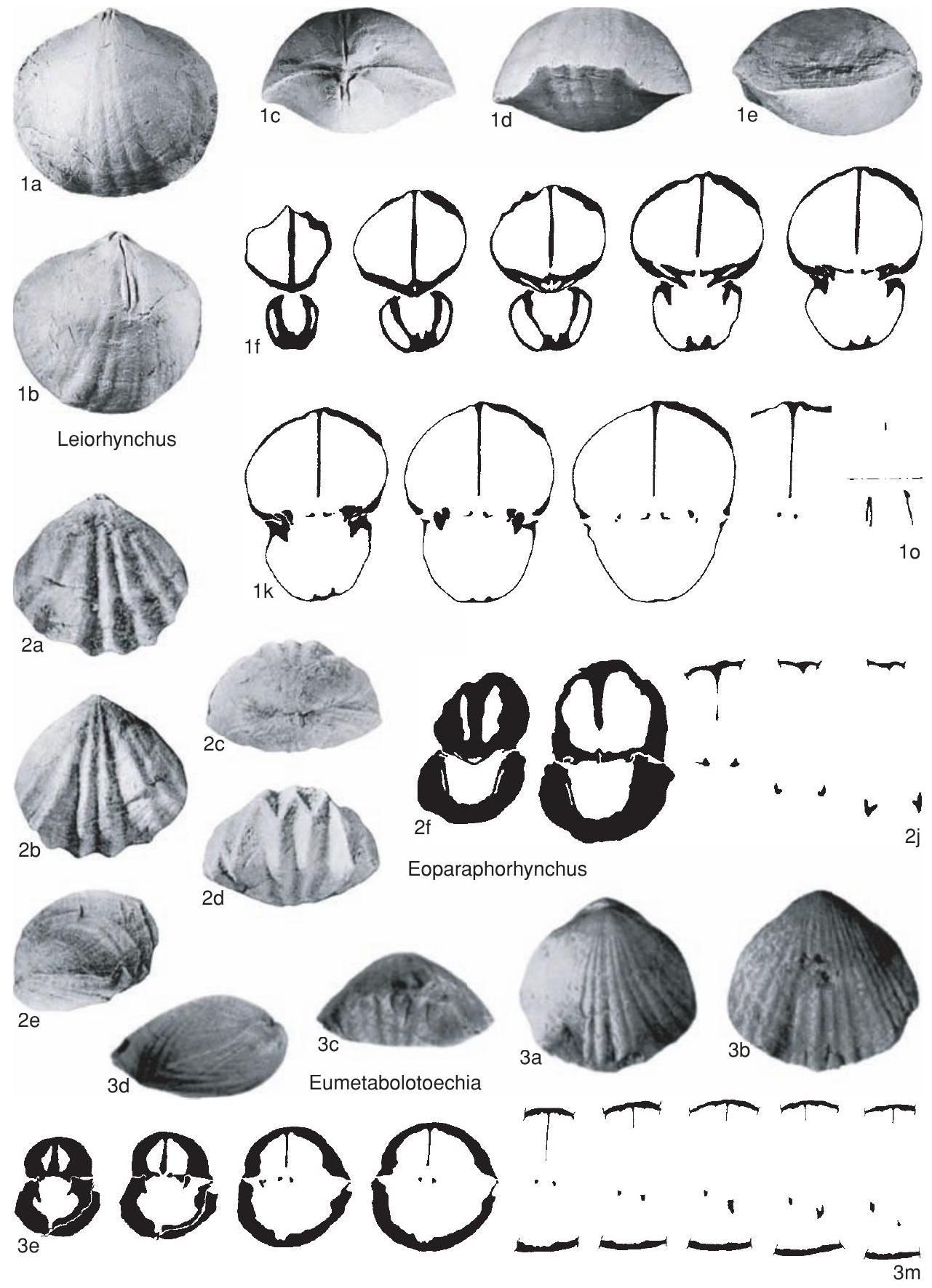Welcome to the Treatise on Invertebrate Paleontology!
Please enter a genera name to retrieve more information.

Leiorhynchus
Classification
Phylum:
Brachiopoda
Subphylum:
Rhynchonelliformea
Class:
Rhynchonellata
Order:
Rhynchonellida
Superfamily:
Camarotoechioidea
Family:
Leiorhynchidae
Subfamily:
Leiorhynchinae
Formal Genus Name and Reference:
Leiorhynchus HALL, 1860a, p. 75
Type Species:
Orthis quadracostata Vanuxem, 1842, p. 168, SD OEHLERT, 1887a, p. 1308
Images
(Click to enlarge in a new window)
Fig. 771, 1a-o. *L. quadracostata (VANUXEm), uppermost Givetian, Sherburne Flagstone, Sheldrake, New York, USA, a-e, dorsal, ventral, posterior, anterior, and lateral views of internal mold, Cornell specimen no. 40605, listed by Sartenaer, 1961f, p. 969, x1.5 (new), f-o, serial sections 0.45, 0.8, 0.85, 0.95, 1.0, 1.05, 1.1, 1.5, 1.8, 3.03 ~mm from posterior, x3.2 (Sartenaer, 1961f).
Synonyms
Liorhynchus, Nudirostra
Geographic Distribution
North America, eastern Europe, Urals, Altai, Siberia, China
Age Range
Beginning Stage in Treatise Usage:
Middle Devonian (Givetian)
Beginning International Stage:
Givetian
Fraction Up In Beginning Stage:
0
Beginning Date:
385.3
Ending Stage in Treatise Usage:
Upper Devonian (Frasnian)
Ending International Stage:
Frasnian
Fraction Up In Ending Stage:
100
Ending Date:
371.1
Description
A genus of brachiopods with a subcircular to transversely ovate outline and biconvex profile. The beak is incurved, and the foramen is small and permesothyrid. The fold and sulcus are low and arise at midlength, with a gently uniplicate anterior commissure. Costae are low and simple, most pronounced on the fold and sulcus, and weak on the flanks. Dental plates are strongly convergent ventrally, occasionally forming a spondylium duplex, and the ventral muscle field is often in a thick callus or deeply impressed. The dorsal median septum is long and high, supporting a short septalium. Hinge plates are divided anteriorly, and the dorsal muscle field is narrow, usually with marginal thickening. Crura are long, thin, and slightly curved ventrally, with a narrow trough opening ventrally.
References
Museum or Author Information
Classification
Phylum:
Brachiopoda
Subphylum:
Rhynchonelliformea
Class:
Rhynchonellata
Order:
Rhynchonellida
Superfamily:
Camarotoechioidea
Family:
Leiorhynchidae
Subfamily:
Leiorhynchinae
Formal Genus Name and Reference:
Leiorhynchus HALL, 1860a, p. 75
Type Species:
Orthis quadracostata Vanuxem, 1842, p. 168, SD OEHLERT, 1887a, p. 1308
Images
(Click to enlarge in a new window)
Fig. 771, 1a-o. *L. quadracostata (VANUXEm), uppermost Givetian, Sherburne Flagstone, Sheldrake, New York, USA, a-e, dorsal, ventral, posterior, anterior, and lateral views of internal mold, Cornell specimen no. 40605, listed by Sartenaer, 1961f, p. 969, x1.5 (new), f-o, serial sections 0.45, 0.8, 0.85, 0.95, 1.0, 1.05, 1.1, 1.5, 1.8, 3.03 ~mm from posterior, x3.2 (Sartenaer, 1961f).
Synonyms
Liorhynchus, Nudirostra
Geographic Distribution
North America, eastern Europe, Urals, Altai, Siberia, China
Age Range
Beginning Stage in Treatise Usage:
Middle Devonian (Givetian)
Beginning International Stage:
Givetian
Fraction Up In Beginning Stage:
0
Beginning Date:
385.3
Ending Stage in Treatise Usage:
Upper Devonian (Frasnian)
Ending International Stage:
Frasnian
Fraction Up In Ending Stage:
100
Ending Date:
371.1
Description
A genus of brachiopods with a subcircular to transversely ovate outline and biconvex profile. The beak is incurved, and the foramen is small and permesothyrid. The fold and sulcus are low and arise at midlength, with a gently uniplicate anterior commissure. Costae are low and simple, most pronounced on the fold and sulcus, and weak on the flanks. Dental plates are strongly convergent ventrally, occasionally forming a spondylium duplex, and the ventral muscle field is often in a thick callus or deeply impressed. The dorsal median septum is long and high, supporting a short septalium. Hinge plates are divided anteriorly, and the dorsal muscle field is narrow, usually with marginal thickening. Crura are long, thin, and slightly curved ventrally, with a narrow trough opening ventrally.
